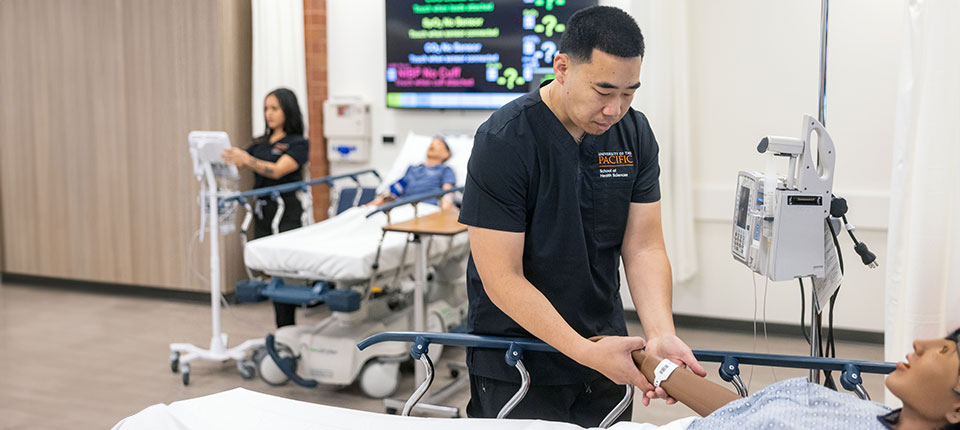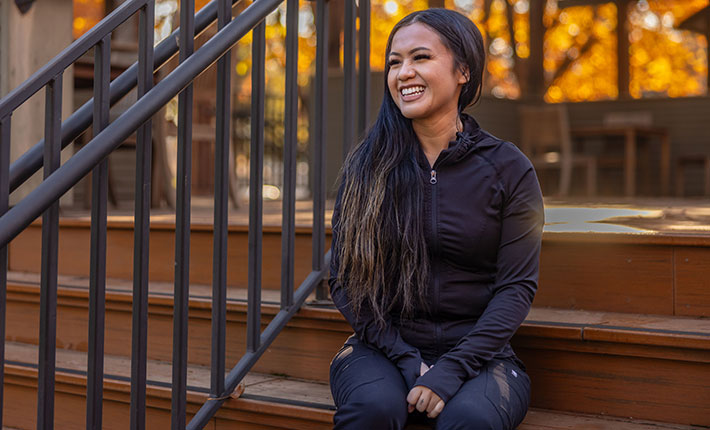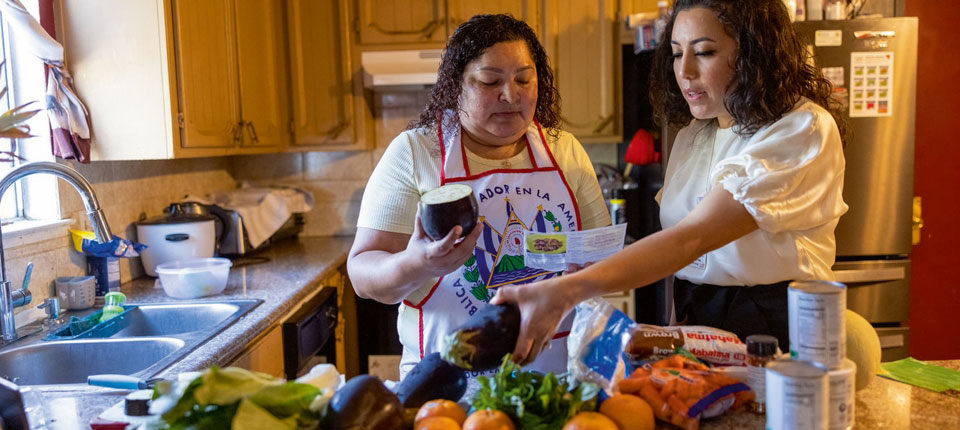
Abbott Scholars Ready to Join the Fight Against Diabetes
Abbott Fund scholarship program trains future healthcare workers to make a difference in their community. ,
May 16, 2024
- Copy Link
- Share on X
- Share on Facebook
- Share on Linkedin
“My mom had diabetes for the longest time. I didn’t know,” Harry Ma begins.
“She kept it a secret from everybody.”
A secret until she was rushed to the hospital, her blood sugar dropping dangerously low. “That’s when I found out.”
The experience taught Ma, in his early 20s at the time, a hard lesson about diabetes. He easily could have turned away from the shock and run in the other direction.
But that’s just not who he is.
Instead, Ma dedicated himself to learning everything he could about diabetes. Now, he’s the one educating others.
His mother’s hypoglycemic event gave him purpose. A scholarship through our Abbott Fund Scholars program at University of the Pacific helped him achieve it. In May, he graduated with a master’s degree in nursing with a specialization in diabetes management, and he aims to start working in emergency care in his hometown of Stockton, Calif.
Stories like his — or Alex Marapao’s or Ana Garcia’s, two more Abbott Fund Scholars you’re about to meet — help illustrate what it truly means to have a community of care.
Each of them has come full circle, from feelings of helplessness to leading the charge for better health outcomes in a place they love — where they grew up.
Along with more than 300 other students and alumni from the program at Pacific, they’re part of a new wave of “diabetes-smart” healthcare and social workers ready to make a difference.

Building a Stronger Pipeline
Being a nurse is both a science and an art. Science in a literal and obvious way. Art in an important but sometimes overlooked way. Alex Marapao is a student of that art: She tries to connect with the people she’s helping so that vital information, such as how they should monitor their blood glucose levels, will stick.
That said, it’s a little easier to connect when you have things in common. Marapao is from Stockton. She grew up with family members who live with diabetes. And, in addition to being in University of the Pacific’s nursing program, she spent several years as a nutrition educator at the Emergency Food Bank of Stockton.
“I have family members who had amputations due to diabetes,” she says. “Now, being in the nursing program, I can see the huge impact diabetes has. The program helped me make connections with people and be a better provider.”
That, on its own, represents a big win.
It also makes you wonder: What would happen if more nurses had that level of knowledge and specialized training? In its most recent Economic Costs of Diabetes in the U.S. report, the American Diabetes Association found that the total annual cost of diabetes in 2022 was $412.9 billion. (Separately, the World Health Organization has called attention to a global shortage of nurses that numbers in the millions.)
As Marapao puts it, equipping nurses and other healthcare workers with diabetes expertise makes the University of the Pacific program “not only unique but essential.”
Through Abbott Fund, our philanthropic foundation, we partnered with Pacific beginning in 2020 to build out a curriculum in diabetes education and strengthen the pipeline of homegrown healthcare workers in Stockton.
That partnership resulted in:
- The country’s first and only master’s degree program for social workers with specialization in diabetes management.
- Master's degree programs for nurses and dietitians with specialization in diabetes management.
- Certificate programs in diabetes prevention and management for frontline workers already working in the field.
When students are accepted in the Abbott Fund Scholars program, they commit to work in the local healthcare system and community for at least two years after graduation.
“During my rotations I’ve told some nurses about our blood glucose monitoring project,” says Marapao, who also graduated in May. “And every nurse always says that’s such an important topic to educate the community about.”
Breaking Down the Barriers to Care
When Ana Garcia lost her father to complications from diabetes, her fight against the disease became a personal one. But she’s not going into battle alone. Her mission is to help others join the fray, and her primary weapon is compassion.
“I want to make sure we give everyone that fighting chance,” she says.
She graduated in 2021, part of the first cohort to graduate from Pacific’s Master of Social Work program, and now manages a team in Stockton that helps 160 clients. She says more than half of these clients live with diabetes.
The Abbott Fund Scholars program proved transformative for her, in part because her father’s health was deteriorating at the same time she was working toward her degree.
She learned the power of empowering others — “making them feel worthy of the care,” as she puts it. In other words, change is possible. People just need the support and encouragement to make it.
Garcia is getting a doctoral degree in health sciences, and she hopes more people can start on the same educational path: “It would be amazing to see (something like the Abbott Fund Scholar program) going nationally.”
More programs like this would mean more students going beyond academic learning and simulations to make real connections with the people they are serving — something Ma has come to value from his training.
He points to the times he has volunteered at free diabetes screening clinics that University of the Pacific hosts in the community as part of its broader partnership with Abbott.
When Ma shares a piece of knowledge with a patient and sees a light bulb go on: “It makes all the studying, all the late nights, every minute, every second worth it. It puts a whole smile on your face.”
What makes him and his classmates different, he says, is that they get to grow into themselves by putting what they’ve learned in practice. During their rotations at Dignity Health St. Joseph’s Medical Center, Ma and two fellow Abbott Fund Scholars, Anita Sentha and Jacimil Varquez, helped launch a program that supports mothers with gestational diabetes.
Ma says his life would look a lot different without the scholarship he received.
He remembers back to when he felt unsure about what he wanted to become: “ ‘I can’t see what's over my fence. I don’t know what’s past that,’ ” he says, recalling his mindset at the time. “ ‘I’m not looking 10 years, 20 years down the line. I’m just looking at what’s next week.’
“All I needed to do was break this fence down — break this one barrier, which is me not thinking that I can do it. The Abbott scholarship allowed me to dream again.”
Abbott and Abbott Fund are investing in communities to help remove the barriers that prevent people from living healthy lives. In collaboration with trusted partners, we strengthen care coordination, build capacity and address the social drivers of health to drive meaningful impact that is sustainable over time.
Related articles
-
Sustainability
What Happens When Communities Unite to Fight Diabetes?
We connected local organizations in Stockton, Calif., to form a diabetes management program that is getting results.
For the latest on Abbott’s life-changing technology, get updates directly in your inbox.
